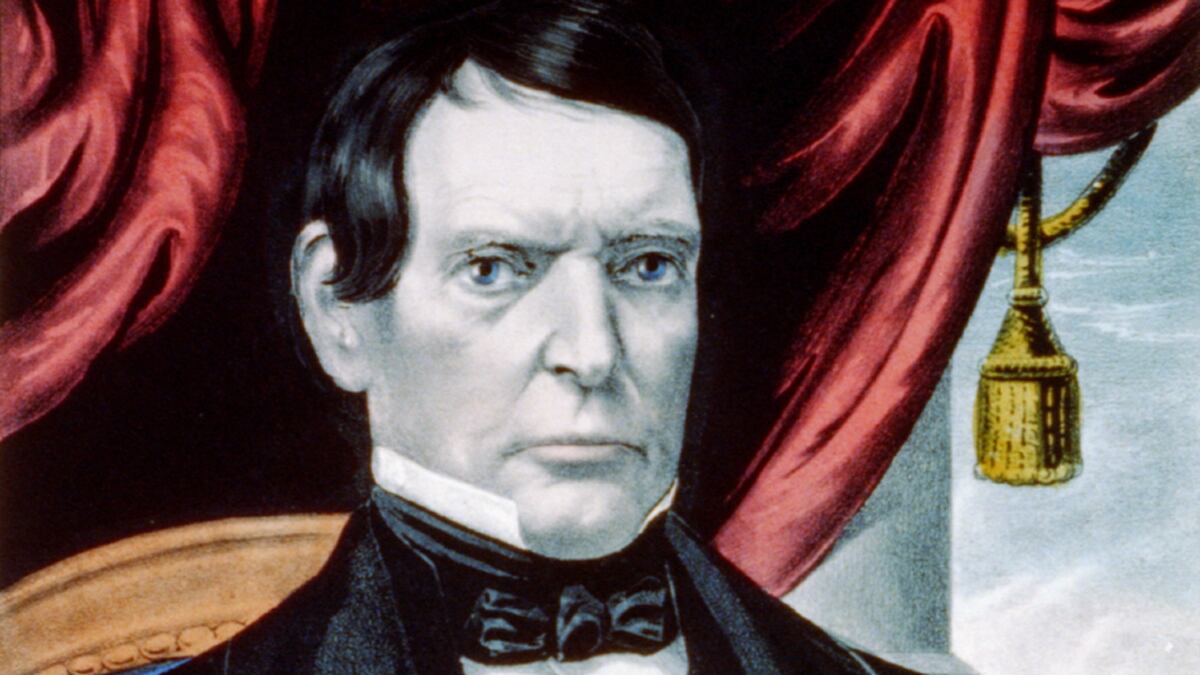Thanks to California’s newly enacted “gay history” law, William Rufus Devane King will finally receive the comprehensive classroom attention that previous generations of educators had so cruelly denied him.
This thoroughly obscure Dixie politician left behind no major accomplishments or stirring speeches, but he represents precisely the sort of forgotten figure the Golden State legislation means to emphasize in retelling the story of America for an enlightened new generation. Many experts believe that King might well qualify as the nation’s first gay vice president.
In signing the bill last week, Gov. Jerry Brown denounced “discrimination in education” and insisted “history should be honest.” According to the governor, the legislation now “ensures that the important contributions of Americans from all backgrounds and walks of life are included in our history books ... It represents an important step forward for our state.”
The new law requires that public-school textbooks and curricula, beginning with kindergarten, should feature “the accomplishments of gay, lesbian, bisexual and transgender Americans.”
Vice President King, who served as a congressman from North Carolina and senator from Alabama prior to his election to the nation’s second-highest office in 1852, may have qualified in two of the new protected categories: as both a “gay” and “transgendered American.”
The lifelong bachelor shared rooms in Washington for 15 years with a fellow bachelor senator, and future bachelor president, James Buchanan of Pennsylvania. Political enemies of the two men whispered about their intimate friendship, and Tennessee Rep. Aaron Venable Brown openly referred to the two comrades as “Buchanan and his wife.” President Andrew Jackson teasingly described King as “Miss Nancy” and “Aunt Fancy,” apparently alluding to the senator’s odd habit of visiting glittering Washington parties dressed as a woman. As if these details weren’t revealing enough, the nieces of the two men collaborated in burning their correspondence to each other after they both died, conceivably to conceal the embarrassing ardor of their mutual devotion.

Now California students will finally get a chance to focus on this crucially important history, as mandated by the state legislature.
But other than Vice President King—whose sexual identity is merely a matter of speculation, after all—could the bill’s sponsors suggest another important figure currently excluded from textbooks who deserves educational attention? As for King’s friend Buchanan, he already receives attention in history texts, but not as some gay pioneer—his biographers scoff at such rumors—but as the inept 15th president of the United States whose dithering and uncertainty helped bring on the Civil War.
The one name prominently cited by the bill’s chief sponsor, state Senator Mark Leno (D-San Francisco, where else?), as deserving more classroom attention was Harvey Milk, the openly gay activist who at long last could claim his “rightful place” in curricula. Of course, Milk already appears in high-school history textbooks, as a pioneering gay elected official who helped launch one of the key social movements of the ‘70s.
So what would his “rightful place” require? Need he receive space and prominence comparable to Washington, Lincoln, and Martin Luther King?
That might be a stretch, given that Milk served less than 11 months in his only public position, as a San Francisco supervisor, before his tragic assassination by one of his colleagues.
Sean Penn has already won an Oscar for portraying Milk in a big-screen biography. Must California students now view that film in class, despite its graphic, R-rated gay sex scenes?
Beyond recent gay-rights organizers like Milk, supporters of the gay-history law might argue that our children need such legislation in order to ensure that Walt Whitman gets proper recognition for his poetic genius—although every English class in the nation already hails Whitman as perhaps the greatest and most original of all American poets.
Whitman, despite writing effusively about his “love” for other men, never gave conclusive evidence of a gay identity, and most biographers conclude that he never experienced same-sex physical intimacy. Under the new law, teachers and curriculum writers may feel pressed to spend more time speculating on what Whitman did or did not do with his male friends and acquaintances, rather than concentrating on Leaves of Grass. Surely, Whitman’s relationship with Abraham Lincoln, idolized from a distance by the poet, counts as more significant to his personal history than any possible connection to the boatmen, soldiers, and bricklayers he befriended in his travels. And would the new law require history teachers to inform students of the inane and utterly groundless speculation that Lincoln himself—known for his passionate pursuit of women, 23-year marriage, and four sons—was secretly gay?
Any course in American literature must cover Whitman’s poetry, but is it truly necessary, or even helpful, to focus on the poet’s sexuality?
Or consider the beloved classical composer Aaron Copland. Although he made few efforts to hide his homosexuality, he never alluded to it in any of his musical compositions, in either of his bestselling books about music, or in countless articles and interviews. Except to satisfy a prurient fascination with a great artist’s private affairs, why should any middle-school or high-school student learning about American music spend precious time on an aspect of Copland’s life that the composer himself clearly considered unimportant?
Then there is another uncomfortable question about the new state-ordered emphasis on sexual orientation as a required subject for history class.
What should teachers do about gay figures from our past whose life and works reflect poorly on the gay community? What about Roy Cohn, ruthless aide to the reviled Senator Joe McCarthy, who died of AIDS even while he berated and degraded his fellow homosexuals? Though my friend Ann Coulter insists she still admires Cohn (and writes about him warmly in her defense of McCarthy, Treason), most journalistic and media accounts portray him as a corrupt bully and loathsome villain.
Should eager young minds now spend time evaluating the contributions of Cohn, or should he be excluded from class because his witch-hunting ways do nothing to promote gay pride?
The aforementioned figures certainly provide fascinating stories from our past, but their sexual histories represent one of the least significant aspects of their biographies. There is no evidence that gay identity played a role in Copland’s great ballet Appalachian Spring or led Cohn to his impassioned anti-communism.
The California legislature’s vote to require—to require!—a curricular emphasis on gay sexuality amounted to a new peak of educational malpractice.
Should teachers now focus with similar intensity on the sexuality of the significant personalities in U.S. history who counted as unequivocally heterosexual? Do we need to concentrate fresh attention on President Taft’s sex life (a disturbing prospect, given his 332-pound girth when he occupied the White House)?
Which brings us back to William Rufus Devane King. If new textbooks in California focus on this sad figure, they can hardly add to the cause of gay pride; King made his personal fortune as one of the largest slaveowners in the country. His Alabama plantation Chestnut Hill, combined with other family holdings, exploited more than 500 human beings as property, and he won election to the nation’s second-highest office on the ticket with Franklin Pierce, the notoriously pro-Southern New Englander whose reckless leadership contributed mightily to sectional strife and earned him a place near the top of all historians’ lists of worst presidents.
Meanwhile, King’s service as veep hardly counts as monumental: Terminally ill with tuberculosis at the time of his inauguration, he never even made it to Washington to take the oath of office. Congress voted to allow King the unusual privilege of a swearing-in on foreign soil, so he got up from his sickbed long enough to raise his right hand in Cuba, where he hoped for curative powers from the balmy tropical breezes at the plantation of a friend (another big slaveowner, of course).
Alas, Vice President King succumbed after just 45 insignificant days in office as part of an inept and disgraceful administration.
That he may now receive greater attention than more deserving vice presidents (George Clinton, the war hero, New York governor, and founding father who served under Madison, comes to mind) merely demonstrates the ludicrous impact of allowing political hacks—and political correctness—to mandate the way our children learn history.






